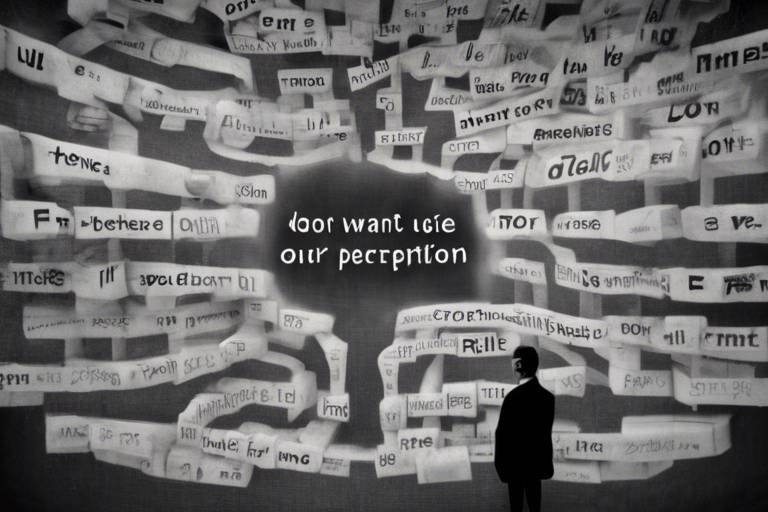Navigating Through the Complexity of Ontological Relativism
Welcome to the fascinating world of ontological relativism, a philosophical concept that challenges our understanding of reality. Imagine standing at the edge of a vast ocean, where the waves represent different perspectives and beliefs about existence. Just as each wave is unique, so too are the frameworks through which we interpret the world around us. This article aims to dive deep into the intricate nature of ontological relativism, exploring its implications, challenges, and relevance in contemporary philosophy and science.
At its core, ontological relativism suggests that reality is not a fixed entity; rather, it shifts and morphs depending on the conceptual lens through which it is viewed. Think of it like wearing different pairs of glasses—each pair offers a distinct view of the world, colored by its own set of assumptions and beliefs. This idea invites us to question the very nature of truth and existence, pushing us to consider how our understanding is shaped by cultural, linguistic, and personal contexts.
As we navigate through this complex topic, we will encounter various perspectives that have emerged over centuries. From ancient philosophers to modern thinkers, ontological relativism has sparked heated debates and profound insights. It encourages us to reflect on our own beliefs and the frameworks that govern our understanding of reality. Are we willing to entertain the idea that our perception of truth may be just one of many? This exploration is not merely academic; it has real-world implications in areas such as science, communication, and interpersonal relationships.
In the following sections, we will unravel the foundational ideas of ontological relativism, delve into the contributions of key philosophers, and examine the role of language in shaping our thoughts. We will also address the challenges posed by critics who argue against relativism and explore its applications in scientific inquiry. By the end of this journey, we hope to illuminate the path forward for future research and discussions surrounding this captivating subject.
- What is ontological relativism? Ontological relativism is the philosophical stance that reality is not absolute but varies based on different conceptual frameworks.
- How does language influence our understanding of reality? Language shapes our perceptions and interpretations, impacting how we conceptualize existence and communicate with one another.
- What are the main challenges to ontological relativism? Critics argue that it undermines the concept of objective truth, but defenders present counterarguments that validate its relevance in philosophical discourse.
- How is ontological relativism applied in science? Different paradigms in scientific inquiry can lead to varying interpretations of data, illustrating how relativism influences scientific theories and practices.

Understanding Ontological Relativism
Ontological relativism is a fascinating philosophical concept that challenges our understanding of reality. At its core, it suggests that reality is not a fixed entity, but rather something that is shaped by various conceptual frameworks or perspectives. Imagine wearing different colored glasses; each pair alters your view of the same landscape. In this way, ontological relativism posits that what we perceive as "real" can differ drastically depending on the lens through which we interpret our experiences. This idea has roots in the works of several influential philosophers, who argued that our beliefs, languages, and cultural backgrounds all contribute to our unique interpretations of existence.
The historical context of ontological relativism can be traced back to various philosophical movements, including postmodernism and constructivism. These movements emphasized the subjective nature of knowledge and reality, challenging the notion of an objective truth that exists independently of human perception. One significant figure in this discourse is Thomas Kuhn, whose concept of paradigms in scientific revolutions illustrated how differing frameworks could lead to radically different interpretations of the same phenomena. This perspective has significant implications not only in philosophy but also in the way we conduct scientific inquiry and engage in everyday conversations.
To better understand ontological relativism, it’s essential to consider its implications. For instance, if we accept that reality varies by perspective, we must acknowledge the potential for conflicts arising from differing interpretations. This can lead to misunderstandings in communication, as individuals may interpret the same situation in vastly different ways. In this light, ontological relativism encourages us to approach discussions with an open mind, recognizing that our own understanding of reality is just one of many.
Moreover, ontological relativism invites us to reflect on the nature of truth itself. If truth is not an absolute, but rather a construct influenced by various factors, how do we navigate moral and ethical dilemmas? This question opens up a rich dialogue about the nature of ethics and the role of cultural context in shaping our moral frameworks. As we dive deeper into this philosophical ocean, we discover that ontological relativism is not just an abstract theory, but a lens through which we can examine our interactions with the world and each other.
In summary, understanding ontological relativism requires us to embrace complexity and ambiguity. It challenges us to reconsider our assumptions about reality and encourages a more nuanced view of truth and understanding. As we explore this philosophical landscape, we can begin to appreciate the richness of diverse perspectives and the importance of dialogue in bridging the gaps between them.

Key Philosophers and Theorists
When we dive into the realm of ontological relativism, we encounter a rich tapestry of ideas woven by some of the most brilliant minds in philosophy. These thinkers have not only shaped our understanding of reality but have also challenged the very foundations of how we perceive existence. One of the most notable figures in this discourse is Immanuel Kant, whose work laid the groundwork for modern philosophy. Kant argued that our understanding of the world is filtered through our senses and cognitive structures, suggesting that what we perceive as "reality" is merely a construct of our minds.
Following Kant, we have Friedrich Nietzsche, who famously declared that "there are no facts, only interpretations." Nietzsche's perspective pushes us to question the absoluteness of truth and encourages a more fluid understanding of reality, which aligns closely with the principles of ontological relativism. His ideas provoke us to consider how our individual experiences and cultural backgrounds shape our interpretations of truth.
Another pivotal figure is Thomas Kuhn, whose concept of paradigm shifts revolutionized the philosophy of science. Kuhn argued that scientific progress is not a linear accumulation of knowledge but rather a series of shifts in perspective. This notion implies that different scientific communities operate under distinct paradigms, each interpreting data through its own lens. Such insights are crucial for understanding how ontological relativism applies within scientific contexts.
Additionally, the work of Wilfrid Sellars cannot be overlooked. Sellars famously stated, "The myth of the given," arguing that our perceptions are always mediated by language and conceptual frameworks. This idea complements the notion that reality is not a fixed entity but is instead shaped by our linguistic and cognitive structures. In essence, Sellars invites us to see that our understanding of the world is inherently subjective, further reinforcing the principles of ontological relativism.
In contemporary discussions, Michel Foucault and Richard Rorty have also made significant contributions. Foucault's analysis of power and knowledge illustrates how societal structures influence our understanding of truth, while Rorty's pragmatic approach emphasizes that our beliefs are contingent upon our social practices. Both thinkers highlight the importance of context in shaping our perceptions of reality.
To summarize, the contributions of these key philosophers and theorists illustrate a profound shift in how we approach the concept of reality. They challenge us to embrace a more nuanced understanding that acknowledges the variability of existence based on differing frameworks. As we continue to explore ontological relativism, it is essential to consider how these ideas have shaped not only philosophical discourse but also our everyday interactions with the world around us.
For a clearer understanding, here’s a table summarizing the contributions of these philosophers:
| Philosopher | Key Contribution |
|---|---|
| Immanuel Kant | Reality is filtered through our senses and cognitive structures. |
| Friedrich Nietzsche | Proposed that there are no absolute truths, only interpretations. |
| Thomas Kuhn | Introduced the concept of paradigm shifts in scientific progress. |
| Wilfrid Sellars | Argued that perceptions are mediated by language and frameworks. |
| Michel Foucault | Examined how power influences our understanding of truth. |
| Richard Rorty | Emphasized the contingent nature of beliefs based on social practices. |

The Role of Language
Language is not merely a tool for communication; it is the very lens through which we perceive and interpret our reality. Imagine trying to describe a vibrant sunset to someone who has never seen one—how do you convey the depth of those colors, the feelings they evoke? This is where the intricacies of language come into play. Our words shape our thoughts, and in turn, our thoughts shape our understanding of existence. This intricate dance between language and perception is a cornerstone of ontological relativism, suggesting that what we consider "real" is heavily influenced by the linguistic frameworks we inhabit.
To further illustrate this point, consider the concept of "time." Different cultures have distinct ways of expressing and understanding time, which can lead to vastly different perceptions of its passage. For instance, in English, we often think of time as a linear progression—past, present, future—while some Indigenous cultures view time as cyclical, emphasizing the interconnectedness of events. This divergence in linguistic structure not only affects how individuals within these cultures experience time but also how they relate to their environment and to each other.
Moreover, the relationship between language and thought is deeply intertwined with the principle of linguistic relativity. This principle posits that the structure of a language affects its speakers' cognition and worldview. For example, the presence of certain grammatical tenses in a language can influence how speakers understand actions and events. In languages that lack a future tense, speakers may perceive future events as less certain or less relevant, which can shape their decision-making processes.
The implications of this are profound. When engaging in dialogue across different linguistic and cultural backgrounds, misunderstandings can arise not just from differences in vocabulary but from fundamentally different ways of conceptualizing reality. To navigate these complexities, it is essential to adopt strategies that promote understanding and empathy. Here are a few key strategies:
- Active Listening: Pay close attention to what others are saying, and ask clarifying questions to ensure you grasp their perspective.
- Open-Ended Questions: Encourage dialogue by asking questions that invite deeper exploration of thoughts and feelings.
- Empathy: Try to understand the cultural and linguistic background of the person you are communicating with, as this can greatly influence their viewpoint.
In conclusion, the role of language in shaping our understanding of reality cannot be overstated. It acts as both a mirror and a mold for our perceptions, influencing everything from our thoughts to our interactions with others. As we continue to explore the depths of ontological relativism, recognizing the pivotal role language plays in our conceptual frameworks will be crucial for fostering meaningful dialogue and understanding across diverse perspectives.

Language and Thought
Language and thought are fundamentally intertwined, acting as two sides of the same coin in our quest to understand reality. When we think, we often do so in the language we know, shaping our thoughts and perceptions through the words and structures available to us. This relationship is not just a philosophical curiosity; it has profound implications for how we interpret the world around us. For instance, consider the way different cultures express time. In English, we might say, "I will meet you tomorrow," clearly indicating a future event. However, in some Native American languages, time is expressed in a way that emphasizes the cyclical nature of existence, leading speakers to perceive time differently. This divergence illustrates a key principle of ontological relativism: our conceptual frameworks, heavily influenced by language, can alter our understanding of existence itself.
Moreover, the Sapir-Whorf hypothesis, which posits that the structure of a language affects its speakers' worldview and cognition, provides a compelling lens through which we can examine this relationship. If our language limits or expands our cognitive abilities, then it follows that our understanding of reality is not only shaped by our experiences but also by the linguistic tools we possess. This idea raises intriguing questions: Does learning a new language change the way we think? Can we even conceive of certain ideas without the vocabulary to express them? These questions highlight the fluidity of our understanding and the potential for language to both constrain and liberate our thoughts.
In practical terms, this interplay between language and thought has significant implications for communication. When engaging in dialogue, especially across different cultural or linguistic backgrounds, misunderstandings can arise not merely from miscommunication but from fundamentally different ways of perceiving reality. To navigate these complexities, it is essential to cultivate an awareness of how language shapes our thoughts and to approach conversations with an open mind. By doing so, we can better appreciate the rich tapestry of perspectives that exist, fostering a more profound understanding of one another.
In summary, the relationship between language and thought is a cornerstone of ontological relativism. It challenges us to reflect on how our linguistic choices shape our perceptions and urges us to consider the implications of these differences in our interactions with others. As we delve deeper into the complexities of this relationship, we uncover a world where reality is not a static entity but a dynamic interplay of language, thought, and perception.
- What is ontological relativism? Ontological relativism is the philosophical stance that asserts reality is not absolute but varies based on different conceptual frameworks.
- How does language influence thought? Language structures can shape our perceptions and interpretations, affecting how we understand and engage with the world.
- Can learning a new language change my perception of reality? Yes, learning a new language can provide new conceptual tools that may alter your understanding and perception of various concepts.
- What are the implications of ontological relativism in communication? Different linguistic and conceptual frameworks can lead to misunderstandings, so it's important to approach conversations with awareness and openness.

Implications for Communication
When we talk about ontological relativism, it’s like diving into a vast ocean of perspectives, where each wave represents a different way of seeing the world. This philosophical stance suggests that our understanding of reality is not just shaped by objective facts, but also by the frameworks we use to interpret those facts. So, what does this mean for communication? Well, it means that when we engage in dialogue, we might be speaking entirely different languages—metaphorically speaking, of course. The implications for communication are profound and multifaceted.
Firstly, the recognition of varying ontological frameworks can lead to misunderstandings. Imagine two people discussing a topic, say climate change. One person might approach the conversation from a scientific perspective, focusing on data and empirical evidence. Meanwhile, another might come from a cultural viewpoint, emphasizing personal experiences and narratives. These differing frameworks can create a chasm in communication, where both parties feel frustrated and unheard. To bridge this gap, it’s essential to develop a mutual understanding of each other's perspectives.
Moreover, ontological relativism encourages us to practice active listening. Instead of merely waiting for our turn to speak, we should strive to genuinely understand the other person's viewpoint. This can be achieved through techniques such as:
- Clarifying Questions: Asking questions that seek to understand the other person's framework can help in reducing misunderstandings. For instance, “Can you explain how your background influences your view on this?”
- Empathy: Putting ourselves in the shoes of the other person allows us to appreciate their perspective, even if we don’t agree with it.
- Open-mindedness: Being open to the possibility that our own framework might be limited can foster a more enriching dialogue.
Additionally, ontological relativism highlights the importance of context in communication. The same words can carry different meanings depending on the cultural or conceptual backdrop. For instance, the term "freedom" might resonate differently with someone from a collectivist culture compared to someone from an individualistic society. Recognizing this contextual variance can empower us to tailor our messages more effectively, ensuring they resonate with our audience.
In practical terms, organizations and teams can benefit from training that focuses on ontological awareness. By understanding that their colleagues might have different interpretations of reality, they can foster a more inclusive environment. This involves not just acknowledging differences but actively seeking to integrate them into the decision-making process. For example, in a diverse team, encouraging members to share their unique perspectives can lead to innovative solutions that might not have emerged in a more homogenous group.
Ultimately, embracing ontological relativism in our communication practices can lead to richer, more nuanced conversations. It challenges us to step outside our own conceptual boxes and engage with the world in a more holistic way. By doing so, we not only enhance our understanding of others but also enrich our own perspectives, paving the way for deeper connections and collaborative problem-solving.
- What is ontological relativism? Ontological relativism is the philosophical view that reality is not absolute but varies based on different conceptual frameworks.
- How does ontological relativism affect communication? It can lead to misunderstandings due to differing frameworks, but also encourages active listening and empathy.
- Can ontological relativism be applied in professional settings? Yes, organizations can benefit from training that focuses on ontological awareness to foster inclusive environments.

Challenges to Ontological Relativism
Ontological relativism, while intriguing and thought-provoking, is not without its critics. One of the primary challenges posed against this philosophical stance is the assertion that it undermines the concept of objective truth. Critics argue that if reality is merely a construct shaped by different conceptual frameworks, then it becomes difficult to establish any common ground for understanding or communication. Imagine trying to navigate a maze where each person has a different map; how can anyone reach the center if there’s no agreed-upon path?
Furthermore, detractors often point out that ontological relativism could lead to a form of extreme skepticism. If every perspective is equally valid, does that mean that all beliefs—no matter how unfounded or irrational—deserve equal respect? This line of reasoning raises ethical dilemmas and questions about accountability. For instance, if one framework asserts that a harmful action is acceptable, should that view hold the same weight as a framework that promotes compassion and understanding? Such scenarios illustrate the potential pitfalls of relativism, where moral ambiguity can flourish.
Another significant challenge is the apparent paradox of relativism itself. Critics contend that if all perspectives are equally valid, then the claim of ontological relativism must also be seen as just another perspective. This creates a self-refuting argument: if relativism is true, then it cannot claim superiority over absolutist perspectives. This paradox can be likened to a tightrope walker who, while claiming to balance perfectly, ultimately risks falling into the abyss of contradiction.
Despite these challenges, proponents of ontological relativism provide counterarguments that defend its validity. They argue that recognizing the plurality of perspectives does not necessarily negate the existence of objective truths; rather, it enriches our understanding of them. By acknowledging that different frameworks can coexist, we can foster a more nuanced dialogue that appreciates the complexity of human experience. This perspective encourages us to approach discussions with an open mind, ready to explore the vast landscape of ideas and beliefs that shape our world.
Supporters of ontological relativism often highlight several key points in defense of their position:
- Contextual Understanding: They emphasize that understanding reality is often context-dependent, shaped by cultural, historical, and social factors.
- Interdisciplinary Insights: Different fields of study (like science, art, and philosophy) can offer valuable insights that challenge a singular view of reality.
- Open Dialogue: Embracing relativism encourages a dialogue that can lead to greater empathy and understanding among diverse perspectives.
In conclusion, while ontological relativism faces considerable challenges, it also opens the door to rich discussions about the nature of reality and our place within it. The tension between relativism and absolutism continues to fuel philosophical debates, reminding us that the quest for understanding is as complex and layered as the realities we seek to comprehend.
What is ontological relativism?
Ontological relativism is the philosophical position that reality is not absolute but varies based on different conceptual frameworks. It suggests that our understanding of existence is shaped by cultural, historical, and social contexts.
What are the main criticisms of ontological relativism?
Critics argue that ontological relativism undermines objective truth, leads to moral ambiguity, and presents a paradox by suggesting that all perspectives are equally valid.
How do proponents defend ontological relativism?
Proponents argue that recognizing multiple perspectives enriches our understanding of reality and fosters open dialogue, allowing for a more nuanced approach to complex issues.
Can ontological relativism coexist with objective truths?
Yes, many supporters believe that while different frameworks may shape our understanding, it is still possible to acknowledge and explore objective truths within those varying perspectives.

Ontological Relativism in Science
When we dive into the realm of science, the concept of ontological relativism takes on a fascinating twist. Unlike the traditional view that sees science as a straightforward path to uncovering objective truths about the universe, ontological relativism suggests that our understanding of reality can shift depending on the theoretical frameworks we adopt. Imagine trying to solve a puzzle, but every time you think you have a piece in place, someone hands you a new set of pieces that fit together in entirely different ways. That’s the essence of ontological relativism in science.
In scientific inquiry, different paradigms can lead to varying interpretations of the same data. For instance, consider the debates surrounding the nature of light. Depending on whether scientists adopt a wave theory or a particle theory, the same phenomena—like the behavior of light in a prism—can be understood in dramatically different ways. This divergence is not merely academic; it shapes the very experiments we conduct and the conclusions we draw.
The implications of ontological relativism in science are profound. It challenges the notion that there is a single, objective reality that scientists are striving to uncover. Instead, it posits that our interpretations of scientific phenomena are influenced by the theoretical lenses we wear. This can lead to innovative breakthroughs as well as significant misunderstandings, as scientists may be operating under fundamentally different assumptions about what constitutes "reality."
To illustrate this point, let’s take a look at a few key areas where ontological relativism has made a significant impact:
| Field of Study | Relativistic Perspective | Implications |
|---|---|---|
| Physics | Wave-Particle Duality | Challenges our understanding of light and matter. |
| Biology | Evolutionary Theory | Different interpretations of evolution can influence conservation strategies. |
| Psychology | Cognitive Behavioral Theories | Varying frameworks can lead to different therapeutic approaches. |
As we navigate through these complexities, it’s essential to recognize that ontological relativism is not merely a philosophical debate; it has real-world consequences. For instance, consider how differing ontological views can affect interdisciplinary collaboration. Scientists from diverse fields may approach the same problem with varying assumptions, leading to potential conflicts or breakthroughs depending on how well they communicate and integrate their perspectives.
Looking ahead, the future of scientific research may very well hinge on our ability to embrace ontological relativism. As we encounter increasingly complex challenges—such as climate change, healthcare, and technology—understanding that there are multiple ways to interpret data and reality can foster greater collaboration and innovation. It allows for a richer dialogue among scientists, encouraging them to explore alternative perspectives and methodologies.
In conclusion, ontological relativism in science invites us to reconsider our assumptions about reality. It’s a reminder that science is not just about uncovering truths; it’s also about understanding the myriad ways those truths can be interpreted. As we continue to explore this fascinating interplay between reality and perception, we open the door to new possibilities and deeper insights into the world around us.
- What is ontological relativism? Ontological relativism is the philosophical view that reality is not absolute but varies based on different conceptual frameworks.
- How does ontological relativism affect scientific inquiry? It suggests that different theoretical frameworks can lead to varying interpretations of the same data, influencing scientific conclusions and practices.
- Can ontological relativism lead to misunderstandings in science? Yes, differing ontological perspectives can create challenges in communication and collaboration among scientists.
- What are some examples of ontological relativism in science? Examples include the wave-particle duality in physics and varying interpretations of evolutionary theory in biology.

Case Studies in Science
When we dive into the world of science, the concept of ontological relativism takes on a fascinating dimension. It’s not just a philosophical abstraction; it has real-world implications that can shape our understanding of scientific phenomena. One of the most compelling case studies is the debate surrounding quantum mechanics. In this realm, different interpretations of the same data can lead to vastly different conclusions about the nature of reality. For instance, the famous double-slit experiment reveals how particles can behave as both waves and particles, depending on how we observe them. This suggests that our observational frameworks can influence the very reality we perceive.
Another intriguing example is found in the field of biological classification. The way we categorize living organisms can vary significantly based on our conceptual frameworks. For example, consider the classification of species. While traditional taxonomy emphasizes a hierarchical structure based on physical traits, newer approaches, such as phylogenetics, focus on evolutionary relationships. This shift illustrates how different ontological perspectives can lead to different interpretations of the same biological data.
Moreover, let’s not overlook the realm of social sciences. Here, ontological relativism plays a crucial role in how researchers interpret human behavior and societal structures. For instance, in psychology, the understanding of mental health can vary widely across cultures. What one society deems a mental illness, another might consider a normal aspect of life. This divergence underscores the importance of recognizing that our frameworks shape our understanding of human experience.
To further illustrate these points, let’s take a look at a table summarizing key case studies where ontological relativism has influenced scientific inquiry:
| Field | Case Study | Impact of Ontological Relativism |
|---|---|---|
| Quantum Mechanics | Double-Slit Experiment | Observation alters particle behavior, leading to different interpretations of reality. |
| Biology | Species Classification | Traditional vs. phylogenetic approaches highlight varying interpretations of biological data. |
| Social Sciences | Cultural Perceptions of Mental Health | Different cultures interpret mental health through distinct ontological lenses. |
These case studies illuminate how ontological relativism is not merely an abstract concept but a practical consideration in scientific research. By recognizing that our frameworks can shape our interpretations, we open up a world of possibilities for understanding complex phenomena. This realization encourages scientists to remain flexible and open-minded, fostering a culture of inquiry that values diverse perspectives.
In conclusion, the interplay between ontological relativism and scientific inquiry is a rich field of exploration. As we continue to investigate the nature of reality through various lenses, we must acknowledge the significant role that our conceptual frameworks play in shaping our understanding. So, the next time you find yourself grappling with a scientific question, consider how your perspective might influence your interpretation. It’s a reminder that in the quest for knowledge, the journey is just as important as the destination.
- What is ontological relativism? - Ontological relativism is the philosophical idea that reality is not absolute but varies based on different conceptual frameworks.
- How does ontological relativism impact scientific inquiry? - It influences how researchers interpret data and understand phenomena, leading to varying conclusions based on different frameworks.
- Can you provide an example of ontological relativism in science? - The double-slit experiment in quantum mechanics is a prime example, showing how observation can alter the behavior of particles.
- Why is it important to consider different ontological perspectives? - Acknowledging diverse perspectives can enhance our understanding and foster a more comprehensive approach to scientific inquiry.

Future Directions in Research
As we stand at the crossroads of philosophy and science, the future of ontological relativism presents a fascinating landscape ripe for exploration. This journey is not just about understanding the implications of different conceptual frameworks; it’s about how these frameworks can reshape our understanding of reality itself. Imagine a world where the very fabric of truth is woven from diverse threads of perception—this is the reality that ontological relativism invites us to explore.
One promising direction for future research lies in the intersection of cognitive science and ontological relativism. By investigating how our cognitive processes shape our understanding of reality, researchers can uncover the underlying mechanisms that drive our perceptions. For example, studies in cognitive linguistics could reveal how language influences thought and, consequently, our interpretation of existence. This could lead to a deeper understanding of the relationship between language and reality, highlighting the importance of context in shaping our beliefs.
Moreover, the implications of ontological relativism extend into the realm of artificial intelligence and machine learning. As we develop algorithms that learn from diverse datasets, the question arises: how do these systems interpret reality? Are they capable of understanding the nuances of human experience, or do they merely replicate the biases embedded in their training data? Addressing these questions could not only enhance the capabilities of AI but also inform discussions about ethics and accountability in technology.
Another intriguing avenue for research is the application of ontological relativism in interdisciplinary studies. As various fields—such as sociology, anthropology, and environmental science—grapple with complex issues, the insights from ontological relativism can provide a richer understanding of how different perspectives shape our responses to these challenges. For instance, in environmental debates, recognizing the diverse ontological views surrounding nature can foster more inclusive dialogues and innovative solutions.
In addition to these areas, it is essential to consider the role of cultural studies in advancing ontological relativism. As globalization continues to blur cultural boundaries, understanding how different cultures construct reality can lead to more profound insights into human behavior and social dynamics. Research in this field can illuminate the ways in which cultural contexts influence our perceptions of truth, identity, and existence.
In conclusion, the future of ontological relativism is not just a theoretical exercise; it is a call to action for researchers across disciplines. By embracing the complexity of reality and acknowledging the multiplicity of perspectives, we can foster a more nuanced understanding of our world. This ongoing exploration is not merely academic; it has real-world implications for how we communicate, innovate, and coexist in an increasingly interconnected society.
- What is ontological relativism? Ontological relativism is the philosophical view that reality is not absolute but varies depending on different conceptual frameworks.
- How does language influence our understanding of reality? Language shapes our perceptions and interpretations, as the structures of language can affect how we think and understand our surroundings.
- What are some challenges to ontological relativism? Critics argue that it undermines the concept of objective truth, suggesting that it leads to a form of skepticism that can be detrimental to philosophical discourse.
- How can ontological relativism be applied in science? In scientific inquiry, different paradigms can lead to varying interpretations of data, showcasing how relativism influences theories and practices.
Frequently Asked Questions
- What is ontological relativism?
Ontological relativism is a philosophical viewpoint that suggests reality is not fixed or absolute. Instead, it varies based on different conceptual frameworks or perspectives. In simpler terms, it means that what we consider "real" can change depending on how we interpret the world around us.
- Who are the key philosophers associated with ontological relativism?
Several influential thinkers have contributed to ontological relativism, including Thomas Kuhn, who discussed paradigms in science, and Wilfrid Sellars, who examined the role of language in shaping our understanding of reality. Their work challenges traditional views of objective reality and encourages a more nuanced understanding of existence.
- How does language affect our perception of reality?
Language is a powerful tool that shapes our thoughts and perceptions. Different linguistic structures can lead to varying interpretations of the same reality. For instance, if two people speak different languages, they might experience the same event in entirely different ways, highlighting the importance of language in our understanding of the world.
- What are the criticisms of ontological relativism?
Critics argue that ontological relativism undermines the concept of objective truth, suggesting that if reality is subjective, then anything can be true. However, supporters counter that recognizing multiple perspectives can enrich our understanding rather than diminish it, allowing for a more comprehensive view of complex issues.
- How does ontological relativism relate to science?
In science, ontological relativism plays a significant role, especially when different paradigms lead to various interpretations of data. For example, researchers might analyze the same set of data but arrive at different conclusions based on their underlying assumptions and frameworks, illustrating how relativism influences scientific inquiry.
- Can you provide examples of ontological relativism in scientific debates?
Yes! One notable example is the debate between Newtonian physics and Einstein's theory of relativity. Each framework offers a different understanding of space and time, leading to distinct interpretations of physical phenomena. Such case studies demonstrate how differing ontological perspectives can impact research outcomes and scientific discourse.
- What are the future directions for research in ontological relativism?
The future of research in ontological relativism looks promising, with opportunities to explore its implications in both philosophy and science. As our understanding of reality continues to evolve, researchers are encouraged to investigate how these ideas can inform contemporary debates and lead to new insights across various fields.



















